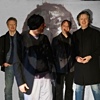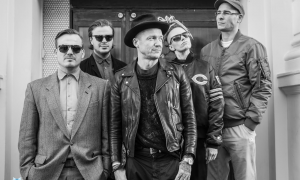Home » Jazz Articles » Live Review » Live From Birmingham: Partisans, Rascals Of Rhythm, Amok...
Live From Birmingham: Partisans, Rascals Of Rhythm, Amok Amor, John McEntire & Schneider Kacirek

Wolverhampton Arena Theatre
November 14, 2015
Partisans have now been playing together for two decades, in a completely unchanging four-piece configuration. Bonds have been formed, lines have intertwined, rapport greases repertoire negotiation, and comfort encourages greater risk-taking. The band made several comments about savouring the Arena Theatre's vibrations, and well they should, given that its acoustics are paramount, imbued with a softly glowing warmth and closeness. The auditorium size is also just right for an intimate encounter, but for some inexplicable reason the audience count was very much lower than usual for this regular Wolverhampton jazz series. This didn't inhibit Partisans, or divert them from delivering a prime pair of sets, abundant in energy, precision and potency.
The band have built up a substantial catalogue over the years, the evening's repertoire dipping into different albums, from freshly composed numbers right back to long-silenced oldies. The exchanges between reedsman Julian Siegel and guitarist Phil Robson provide the melodic dance, and the majority of the dynamic solos, but electric bassist Thad Kelly frequently spills lines that can't be forgotten, his aggressive amplifier tones pushing them out from the heart of the storm. Meanwhile, drummer Gene Calderazzo was in a sustained state of hyper-arousal, never letting up in his manic driving, keeping the momentum at full-force whilst continually embellishing with staccato bursts, rotary thundering and general targeted clatter. He played like this was going to be his final statement, his last word on the power of percussion.
They jumped straight out of the traps from the outset, with the rampantly overcharged "Flip The Sneck" finding Robson gratifyingly turning on the scuzz switch to sully his sound. His guitar is meaner when in this mode, as opposed to the softer John Abercrombie dapple-setting he alternatively employs. This is part of the crafty tactics used to alter the Partisans attack velocity, switching between studied calm and ripped-out fracas. Your scribe hasn't noticed such a thing before, but this combo frequently deal out frissons of Miles Davis, from his various stylistic eras, mostly the fusion periods of the early 1970s or '80s, but also with an atypical melodic throwback to his classic "All Blues." It's not clear whether these are deliberate references or subliminal obsessions. Whichever way, they provide an appealing touch, without being overly dominant.
Robson announces that Siegel is "just about to don the goose, as we call it," meaning his bass clarinet. Your scribe has never previously pondered this similarity, but now that image is graven into his temples, particularly suggesting the curve of the beer-pump for a Goose Island brew. This was the fastest change ever, for within moments Siegel was back on the tenor saxophone again. Such is his rich armoury of reeds, all resonantly played, with seethingly circuitous solos. Close to the end, Partisans paid tribute to "that great mouse," Mickey, with their tune entitled simply "Mickey," Siegel getting into a creamy tenor statement, spaciously backed by his three cohorts. An audience member had cried out for "Last Chance," a less-aired number from back in 2005, so the band had clearly reminded themselves how it went during the intermission, rolling forcefully into their encore, with a running clash between goose and guitar, suggesting fuzz bass and grunge-ing organ respectively, in their tonal qualities. Ultimately, Miles Davis was crushed under the Soft Machine!
Dave Moorwood's Rascals Of Rhythm
Solihull British Legion
November 15, 2015
The Rascals Of Rhythm rummage deeply into the vintage jazz repertoire, uncovering ancient chestnuts that are hardly ever heard on the traditional jazz club circuit. Most of their selections are from the 1920s and '30s, some even earlier, and their choices are often not the most likely, or even if they are, the arrangement might be based around the tune-version from a less obvious interpreter. Guitarist Dave Moorwood is a focused leader, intent on his own peculiar perspective, invariably dropping in an explanatory nugget or two in his introductions. The Rascals Of Rhythm don't actually have a drummer in their ranks, which is highly unusual for a band of this type. Consequently, Moorwood's bullish strumming acts as the propellant force (rather than the somewhat quieter bass), his sound shorn of any mellow reverb, clipped and dry, emphasising the curt qualities of his hard-worn strings. It's an exciting change in tone from what's often expected, providing an edge of excitement to the proceedings. Moorwood doesn't take many solos, leaving most of the out-front action to his twinned reedsmen, Mike Wills and Tony Blincowe.
The Rascals opened with "Copenhagen" (after Bix Beiderbecke), followed by "Take Me To That Land Of Jazz" (from way back in 1919), with Moorwood offering one of his occasional vocals, the pianist actually sitting on his amplifier, spending much of the first set trying to balance himself within the spread. It's not just the old American numbers that are fodder for this combo, as they threw in Humphrey Lyttelton's "Mezz's Tune." This was chased by "A Sailboat In The Moonlight," one of the least traversed tunes in Billie Holiday's book, although Moorwood was also casting his glance over Ruby Braff's reading. Wills stuck with his curved soprano for the majority of the tunes, but brought out his tenor for this one. He returned to soprano for "Big House Blues," a fairly obscure Duke Ellington ditty. This featured paired sopranos, one straight, the other curled, exchanging sinuously intertwining lines. Then the reeders doubled on clarinets for "Eccentric," traipsing into sudden stops and starts.
A highlight of the second set was "Boiled Owl," penned by Marty Grosz, a song that can spar with the works of Slim Gaillard or Screamin' Jay Hawkins in the arena of the ridiculous. Unusual selections from Louis Armstrong ("Once In A While") and Sidney Bechet ("Passport To Paradise") followed, the latter making a stately parade, the Rascals managing to coax more than the usual number of dancers onto the floor. Apparently, the band always finishes with Duke's "Ring Them Bells." We're not sure why, but it did make for a suitably romping conclusion.
Amok Amor
mac
November 17, 2015
Jazz adventuring on an international level, Amok Amor boasts a volatile membership of bassist Petter Eldh (Sweden), alto saxophonist Wanja Slavin, drummer Christian Lillinger (Germans both), and trumpeter Peter Evans (imported from NYC). Their European tour took in three German dates, one night apiece in Austria and Italy, and a pair of gigs in England, the London jazzfest first, followed by this intimate set in Birmingham. They played in the mac's Hexagon Theatre, which adopts the classic Colosseum model, but on a tiny scale, with steeply tiered seats looking down on a flat performance space. In such a room, there was no chance of escaping this combo's aggressive assault. The usher even locked the door...
The show marked the debut of a new promoting partnership. Firstly, the Fizzle collective, those long-running hosts for Birmingham's regular free improvisation sessions in The Lamp Tavern, and secondly, Tony Dudley-Evans, taking a break from his duties with the Jazzlines organisation, housed at Symphony Hall. Their manifesto appears to be a merging of Fizzle's mostly hardcore freedom bias and TDE's championing of abstraction-with-occasional-structure. Amok Amor were perfectly suited to this outlook, given their overall Ornette Coleman aura, infected by ample outbreaks of scattershot, virtuoso diversions from the theme at hand. Even if extremely wayward, a solo, or simultaneous multi-player 'solo,' would crack back into the tune with an unholy precision. These four have a.) been rehearsing prodigiously, b.) were tour-honed into brilliance and/or c.) have an innate rapport.
Well, what a lovely racket they made, even playing almost all-acoustically, with just Eldh's upright bass given a modest amplifier-tweak. Leaping right in, the horners took extensive soloing time, not letting up on the high invention-flow for a second. Their object is to push themselves to the limit, testing breath capacity, fingering speed and idea-fishing to the maximum levels, as Lillinger threw drum-volleys across the already choppy surface. His collection of drumhead additions and tiny objects were impressively deployed, not only for small sounds, but also as part of a full, tonally-altered rotary rolling. Besides the inescapable Ornette comparison, this bunch prompted memories of the John Stevens Free-bop combo, in the way that they take bebop as a beginning, then pull out all its roots and re-plant in an unfamiliar, war-torn landscape. Fluidity was constant, but with jarring swerves in course, Evans bringing in some military bugling influences, then proceeding to drone without remission, facilitated by his circular breathing skills. Such a layered plain came as quite a wide-vista surprise, placed in the midst of the majority Amok Amor sound of swinging skyscrapers, scurrying rodents, screaming motorists and deep subway rumbles. They are the proud possessors of an epic density, and a hyperactive dash, always highly detailed, as they blasted flat out, skating across a dangerous forest of miniature spikes and spines.
John McEntire/Schneider Kacirek
The Tin
November 18, 2015
The Chicagoan drummer John McEntire is most familiar as a member of Tortoise, and to a lesser extent, The Sea And Cake. Dusseldorf electronicist Stefan Schneider is a founder member of Kreidler and To Rococo Rot. Percussionist Sven Kacirek (from Hamburg) is primarily known (or unknown, to most) for his solo work. Packaged together for a tour, this combination of players promised a peachy teaming. It transpired that, on this first UK date of three, in Coventry, they'd already spontaneously decided to cross the borders between McEntire's solo set and the other pair's duo opening performance, all three banding together to close out the evening. But first, Schneider Kacirek opened, delivering such an inspirational sequence of sounds that anything to follow was destined to have difficulty attaining similar levels.
Kacirek's stripped kit used one flat drumhead as a base for attaching a metal plate, or a ceramic saucer, his snare clicked sparsely, bass drum equally taciturn, only bumping at severely strategic moments, a champagne-bottle shaped plastic shaker employed like a skeleton's heartbeat, brush-sticks faintly hissing. Meanwhile, he was spiderwebbing with electronic effects, in-between his clipped, implied beats. Schneider tweaked the controls on his tiny cluster of boxes, other hand held aloft expressively, like that of a blues harmonica-blower. Some of his sounds bled into the percussion realm, others lumbered low, as disembodied bass stomach-rumble. His forest of cycling repeats sometimes paused, to savour the cricket-susurrus. This duo's sensitivity to mechanoid minimalist funkin' was astounding, their sonic gaps being an important element in the cranial dance.
It looked like McEntire was just about to play, but the sound desk captain hadn't turned off the background music. Then it suddenly became apparent that the distant, muffled and dated electronic soundtrack was actually emanating from the sticksman's laptop. When sitting close to the stage, these sounds were strangely frontally-placed once McEntire's drumming launched. Following on from the entire-body experience of Schneider's electronics, McEntire's backing (for that was the ultimate character) was very poor in quality, taste and technical fluency. His drumming wasn't sonically integrated on the same level as the laptop content, and his actual stick-work was too loud, too simple and sometimes prey to slippages of timing, slowing down or speeding up. It would be interesting to imagine how McEntire's performance would have sounded if it had stood alone, but in this context it made for a radical slump.
When all three players convened for the final set, McEntire was forced into subtlety, sounding much better, as if he was entirely used to being part of a band, rather than shouldering the burden alone. Kacirek concentrated on small marimba, and a third type of music emerged, with only Schneider staying steady in his all-evening approach. This was certainly a relief after the surprising disappointment of McEntire's solo spell.
Photo Credit: Garry Corbett
Tags
Partisans
Live Reviews
Martin Longley
United Kingdom
Birmingham
Julian Siegel
Phil Robson
Thad Kelly
Gene Calderazzo
Bix Beiderbecke
Humphrey Lyttelton
Billie Holiday
Ruby Braff
duke ellington
Marty Grosz
Slim Gaillard
Screamin' Jay Hawkins
Louis Armstrong
Sidney Bechet
Petter Eldh
Wanja Slavin
Christian Lillinger
Peter Evans
Ornette Coleman
About Partisans
Instrument: Band / ensemble / orchestra
PREVIOUS / NEXT
Support All About Jazz
 All About Jazz has been a pillar of jazz since 1995, championing it as an art form and, more importantly, supporting the musicians who make it. Our enduring commitment has made "AAJ" one of the most culturally important websites of its kind, read by hundreds of thousands of fans, musicians and industry figures every month.
All About Jazz has been a pillar of jazz since 1995, championing it as an art form and, more importantly, supporting the musicians who make it. Our enduring commitment has made "AAJ" one of the most culturally important websites of its kind, read by hundreds of thousands of fans, musicians and industry figures every month.




























